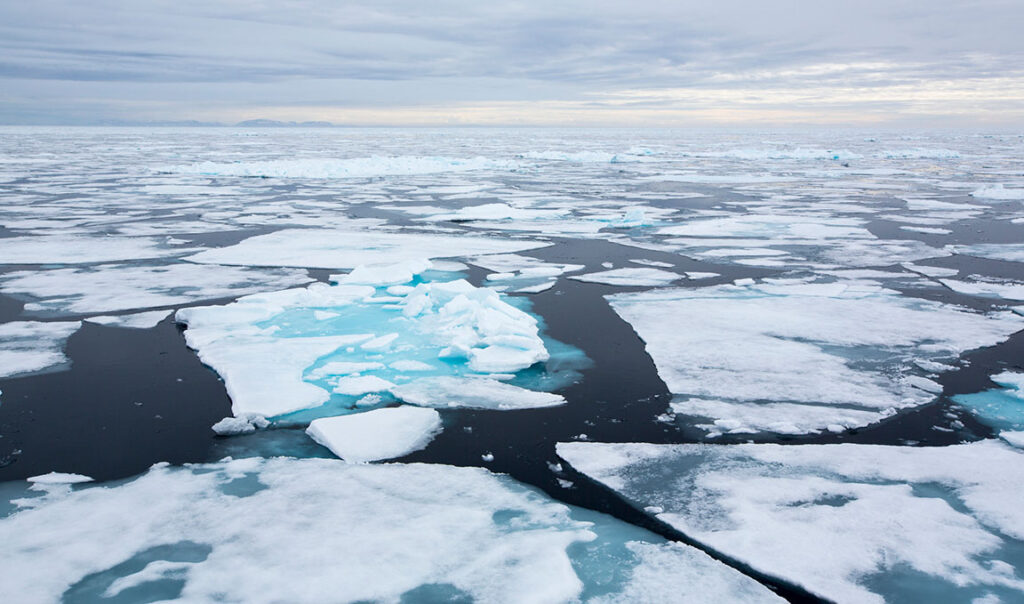A U.S. Arctic expert argued in an op-ed in May 2024 that the United States should continue to cooperate with Russia on scientific projects. AFP/GETTY IMAGES
THE WATCH STAFF
With the ongoing effects of climate change on Arctic ecosystems, collaborative multinational scientific projects remain vital to the region, necessitating a resumed cooperation between Western Arctic nations and Russia, despite the latter’s increasingly authoritarian and expansionist behavior. While such normalized relations in specialized fields may be unlikely in the near term, it is imperative that the U.S. and its allies try. Troy Bouffard, director of the Center for Arctic Security and Resilience at the University of Alaska, outlined this argument in a May 31, 2024, op-ed for the High North News, a Norwegian newspaper.
However, Bouffard doesn’t harbor any delusions about Russia’s aggressive actions in recent years, especially its unprovoked invasion of Ukraine in 2022. Following the Western condemnation of that action, Russia withdrew or signaled its intent to leave a slew of Arctic regional cooperative associations and treaties, including the Arctic Council, the Barents Euro-Arctic Cooperation, the Fisheries Agreement with the United Kingdom, the Barents Fisheries Agreement with Norway, and the U.N. Convention on the Law of the Sea. Russia has also indicated that it will cease support for the International Space Station after this year and will no longer formally participate in the New Strategic Arms Reduction Treaty — a 2011 agreement between the U.S. and Russia that limits the number of deployed nuclear weapons for each country, which is set to expire in 2026.
Those actions confirm that decades of trying to persuade Russia to participate in a rules-based international order have failed, Bouffard wrote. “Since the end of the Cold War, the West has sought to engage Russia through soft power mechanisms — efforts to attract and persuade — in regional and global institutions. This is neither feasible nor effective in a global order that Russia actively seeks to revise. What is left is hard power — efforts achieved through coercion. Moscow is highly cognizant of the Cold War and its decades of preponderantly hard-power competition. Add to that the authoritarian nature of the Kremlin regime and we should remember that this is Russia’s comfort zone,” he wrote.
But the authoritarian nature of Russian President Vladimir Putin’s regime shouldn’t discourage crucial and highly urgent scientific study of climate change, Bouffard argued. “Scientific cooperation remains the key to finding common ground and overcoming adversity through united efforts. Without doubt, Moscow’s war in Ukraine remains absolutely abhorrent, but the need to scientifically cooperate with Russia on global-scale, climate change-driven crises and issues should necessarily remain a priority toward the greater good. Science increasingly informs us of the best path forward to prepare and/or prevent what seems like a future of catastrophic doom. Justification to work together cooperatively exists, even if it requires consideration of working with adversaries,” he wrote.
Bouffard draws on the academic work of Sebastian Kevany, arguing that instead of engaging Russia with soft power or purely coercive power, the U.S. and its allies should promote a “smart power” strategy of working with Russia on projects that benefit the greater good. Kevany’s 2013 article in Global Public Health focused on global health programs and the smart power they could exert. A similar model might be tried with scientific cooperation with Russia in the Arctic, Bouffard wrote.
The U.S. Arctic Strategy, released in late 2022, doesn’t contain much optimism that Bouffard’s vision will be enacted in the near future, barring a marked change in Russian behavior. “A peaceful Arctic will have guardrails to manage competition and resolve disputes without force or coercion. Stability results from countries acting responsibly and in accordance with international law, rules, norms, and standards, including freedom of navigation. A prosperous Arctic features healthy and vibrant Arctic communities and sustainable economic growth. We aim to secure these objectives in the U.S. Arctic and throughout the region, working primarily with our allies and partners to solve shared challenges. Russia’s unprovoked war of aggression against Ukraine has rendered government-to-government cooperation with Russia in the Arctic virtually impossible. Over the coming decade, it may be possible to resume cooperation under certain conditions. Russia’s continued aggression makes most cooperation unlikely for the foreseeable future,” the strategy document stated.

